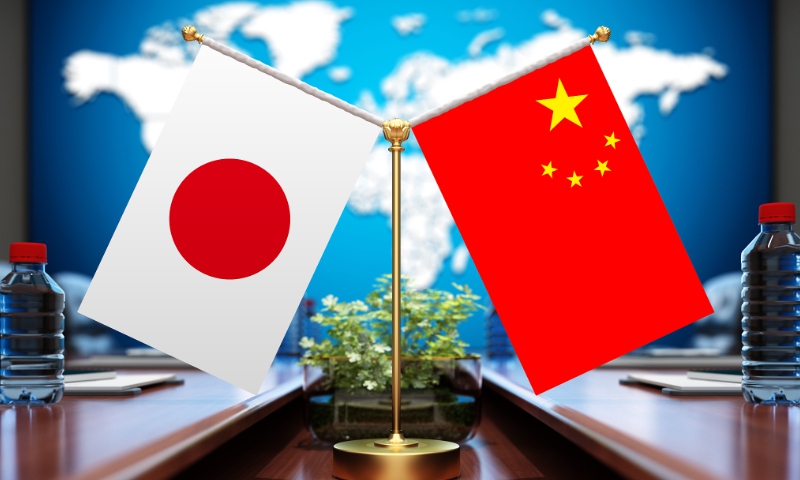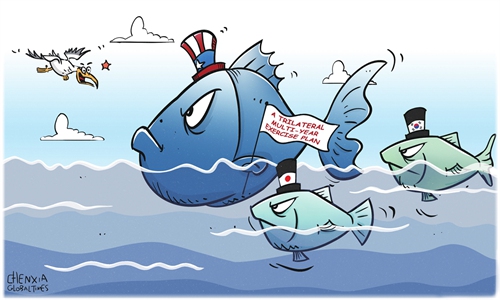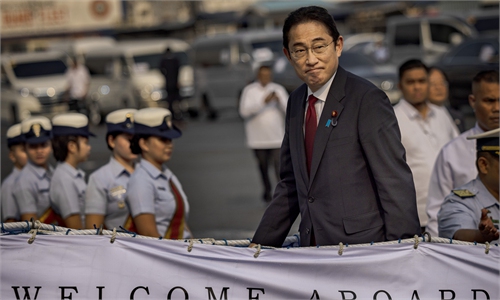China, Japan to set up mechanism for export controls after commerce chiefs' meeting at APEC

China Japan Photo: VCG
Chinese Commerce Minister Wang Wentao met with Japanese Trade Minister Yasutoshi Nishimura in San Francisco, the US, where the two sides agreed to set up a dialogue mechanism for export controls and a working group for improving the business environment, the Ministry of Commerce (MOFCOM) said on Thursday.
The meeting, which took place on Tuesday during the APEC Economic Leaders' Week in the US city, came as China-Japan bilateral economic and trade ties have been deteriorating due to Japanese moves, including the dumping of nuclear-contaminated wastewater into the sea against broad international opposition.
Japan has also actively participated in the US crackdown against China in chips, while accusing China of "economic coercion." Specifically, under US pressure, Japan in July announced export controls on 23 crucial types of chipmaking equipment.
During the meeting in San Francisco, Chinese officials raised those issues. The Chinese side exchanged views with the Japanese side on issues such as Japan's export controls on semiconductor manufacturing equipment and maintaining the stability of industry and supply chains, according to the MOFCOM.
The two sides also talked about China's application to join the Comprehensive and Progressive Agreement for Trans-Pacific Partnership, also known as the CPTPP, and support for new members to join the Regional Comprehensive Economic Partnership, or RCEP, the ministry said in a statement.
While details of the dialogue mechanism and the working group were not immediately released, these moves marked a shift in what had been rapidly souring bilateral ties following Japan's nuclear wastewater dumping.
On August 24, after the Japanese government disregarded repeated concerns from China and other countries in pushing ahead with its nuclear-contaminated wastewater dumping plan, China halted imports of all aquatic products from Japan. Following the ban, China's imports of fish and shellfish from Japan dropped to zero in September, compared with 149 million yuan ($20.37 million) in August.
That apparently dealt a blow to Japan, as Japanese officials have been trying to urge China to drop those curbs with what Chinese analysts called desperate efforts. Last month, following a G7 trade ministers' meeting in Japan, a statement called for the "immediate repeal" of import curbs on Japanese food products, which it said amounted to "economic coercion." The statement did not mention China, but many Japanese and Western media outlets said it was aimed at China.
Meanwhile, Chinese officials and experts slammed Japan's claims and maintained that the curbs were aimed at protecting Chinese consumers and that it was the G7 that is engaged in "economic coercion" against other countries.
"The [ban] on Japanese aquatic products has had a huge impact on Japan, and it knows that it cannot deal with that alone so it wants to bring in the G7," Wang Yiwei, director of the Institute of International Affairs at the Renmin University of China, told the Global Times, noting that such attempts by Japan won't change China's stance.
The MOFCOM's statement on Thursday did not mention the issue of seafood imports from Japan, but instead focused on Japan's export controls on chipmaking equipment. That shows China's serious concerns in this regard that Japan must address if it seeks to improve bilateral ties, Chinese experts noted.
Da Zhigang, director of the Institute of Northeast Asian Studies at Heilongjiang Provincial Academy of Social Sciences, said that the Japanese move will hurt global semiconductor industry chains and backfire on its own chip industry, which relies heavily on sales in the Chinese market.
In San Francisco, Wang also met with his South Korean counterpart, during which the two sides exchanged views on deepening bilateral trade and investment cooperation, maintaining the stability of industry and supply chains and strengthening regional and multilateral economic and trade cooperation, according to the MOFCOM on Thursday.



